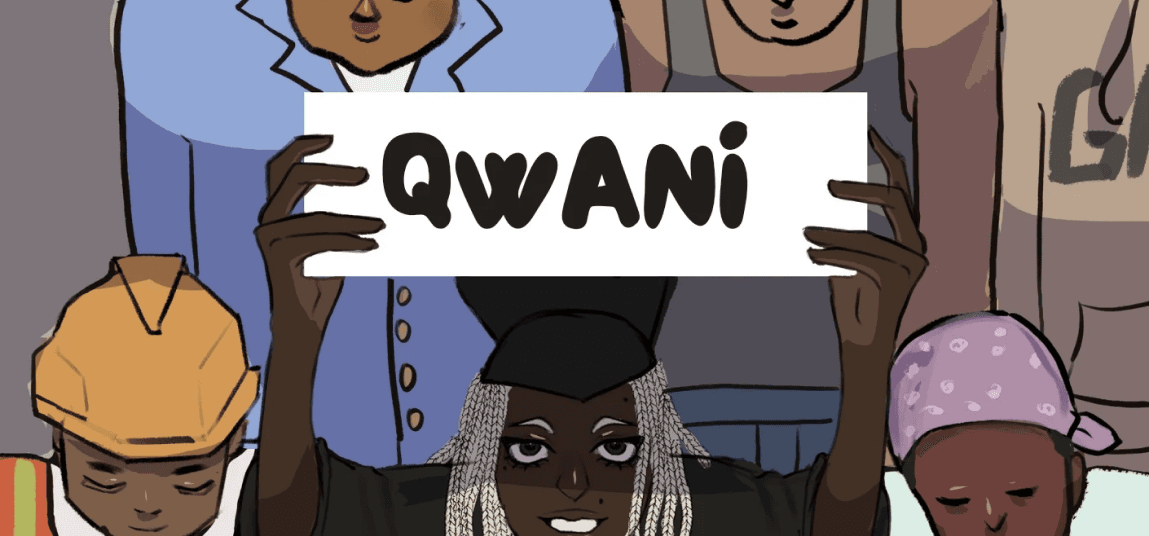PublishedApril 1, 2024
QWANI BOOK 2
“Qwani Hunitrust?” Okeyo asks the audience, before Lawie answers this by painting a clear picture of the most deceptive city, Nairobi, in the Soul of the city. But before we can even imagine how chaotic Nairobi is

Genre
Flash FictionFilm ReviewsMusic ReviewsPoetryPhilosophy Short Stories Sheng'
“Qwani Hunitrust?” Okeyo asks the audience, before Lawie answers this by painting a clear picture of the most deceptive city, Nairobi, in the Soul of the city. But before we can even imagine how chaotic Nairobi is, Ang’ana invites us to Nakuru where his phone was nearly stolen and so we sit on this journey as Gachagua’s Passengers. The journey, however, becomes rough, as seen by Kiptoo’s Despair, and so we beckon Toti to solve it through her Catharsis.
To avoid stress, Brice convinces us that we all need to think like children and Innocent Ouko agrees because there is beauty in the struggle and ugliness in the pain. This is true, even to the hopeless romantics, for whom Omolo does a review of Kinoti’s Ntangoja. The review of the song is so good that Nyakinyua cannot resist a Dance to it! Lakini kila mtu anaeza ngojea mapenzi kweli? We ask ourselves this before Kamau answers by saying Mapenzi yakikupiga chenga utasurrender.
Mark’s Begone thought challenges our awareness of how we respond to our thoughts. And because we have as many thoughts as there are stars in the universe, Mitchel Kakai gets us into a spacecraft, Apollo 24, on a tour of A Thousand Splendid Stars. Before we can even jet back to earth, Diana Ngato tells us of how Nature's Symphony whispered secrets of the stars. But the whispering doesn’t end there, as we see Masinde also whispered to Adelaide.
Waswahili waliposema ‘Ana sauti ya kumtoa nyoka pangoni’, they had Kiptoo in mind, because his Brave Echoes bring Metier out of the Abyss and convince Keith to change his mind from Geo-Centrism to Helio-Centrism to Iliakos-Centrism. Before you know it, it is Morning and Kimemia is Escaping Manyani. He must be At the Banks of the Ganges with Muthotho thinking about Njoki’s Defiance. Omenya, watching this from a distance, summarises it as An anamnesis of you.
Arudo comes out, guns blazing, In defense of Hypocrisy, leaving Lewis-Miller Kaphira Lost for words. Ndaiga explains to them that we are beautifully and wonderfully made and Mutheu backs this up with a review of how Tai-Lung was wronged. Quite Intricate, right? Rita believes so.
Elsewhere, a crowd gathers to talk about Suicide, led by Nekesa. Dendrick secretly sneaks in with a mysterious box similar to Pandora’s, and when he opens it, Death is unveiled. Everyone scatters, save for Mark, who wonders out loud “What do we have to fear about this?” From hearing this, Imanene describes the recurrent nature of life to him, in a review of Repeat until death. Byron Apuko responds to this Msiba by singing Waithaka’s Ode to her soul and Alvin ends up lost in Grief’s reverie.
The burning end of a Cigarette offered by Muriira may or may not be Javan’s Cheap Poison. But proceed with caution on 6viewsii8k by Birhange, because that’s an addictive one for sure. Story ilianza like this! Ho! I’d be damned not to mention Anisa of the Sunflowers’ Erotic Sentience. Confessions of a sensualist can be addictive too, no? Churchill Osimbo, an addict of the sensual, visits the therapist and talks of when he thinks of you, and Ouko vows he can transform him.
In the meantime, Amanda wonders how to make this boy go home with her and one week later, Mwangi gets Bantu, the man of the Dreadlocks to go. But just before that, Mutheu gives him The Menu to buy Chips za Sonford from Gathoni.
Lydia Mutuku’s Feet are killing her and when she asks for a doctor, Carl signals, instead, that she needs a Hero to save her. So, Natasha takes it upon herself to go to the Market. East Mpaka London is the album on repeat in her headphones while she walks, a recommendation by Anne Nduati, the musical guru.
Then there is Chacha who Yesterday encountered Wayua on an Ode to the African Child. Guess what, on the same Yesterday, Natasha too went out to sea. This was right after watching the Wagoner with Ephraim.
I-Jongo haitawai kuset free is a philosophy drawn up by Petronilla and supported by Nyakinyua in ‘Kiliniramba.’ For a conceptual framework in support or against the self sabotage theory, Keith's Hegelian Dialectics does the job and guides the arguments and debates in Petronilla’s and Nyakinyua’s occurrences. Equally, when Wasai’s Film meets Philosophy, Birhange’s Oppenheimer review becomes a stellar read.
Franscine embarks on gifting herself freedom at 24 years because when Kenyanito describes the Psych Ward Chronicles and Olivia talks of the Male Ward Dilemma or even Wanjiru describes Dysmorphia, Franscine agrees with Humphrey on the Alchemy of Pain. Pain is always a precursor to change. However, the people don’t seem to have suffered enough in Omondi Were’s narrative, and he wonders whether Kitambi na Dhambi ni Mapacha.
Sheila reminds us that throughout a year we live the age turned into the next, something so confusing that Kinyita is left thinking in third person in order to understand it…Kerongo writes An Open Letter regarding Kombe’s Promise. And by the way, Omenya almost Started a fire, so if you are reading this now, Muthoni says that it’s too late!
Join Community
Step into Qwanis vibrant circle of creatives. Here, every voice matters, every story thrives, and camaraderie blooms. Become a part of our literary mosaic today!


© 2025 Qwani. All rights reserved. Designed by Qwani. Powered by Chari Designs
